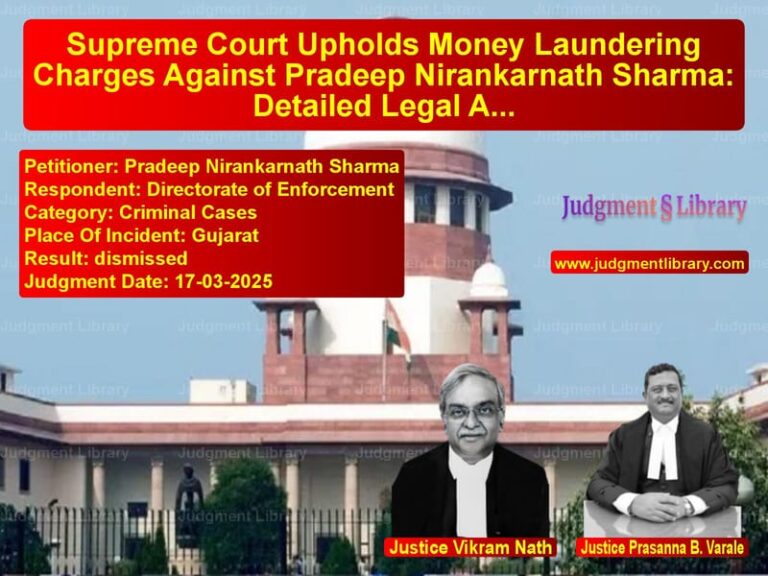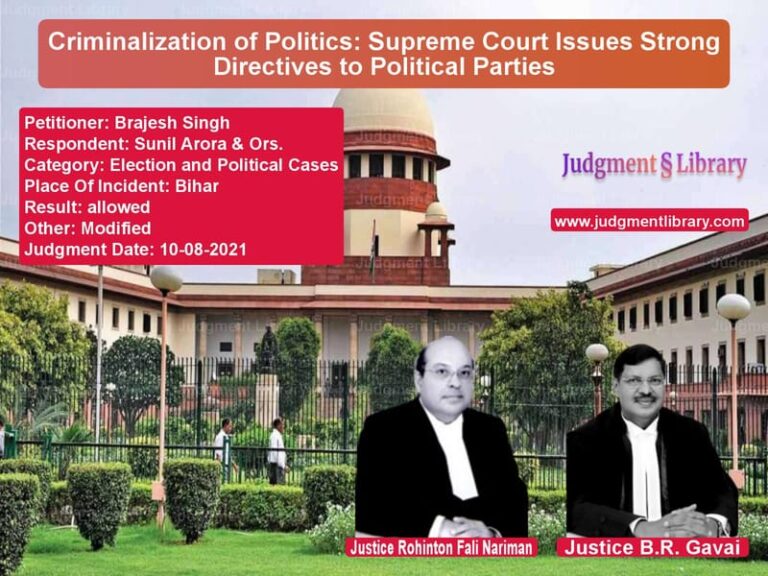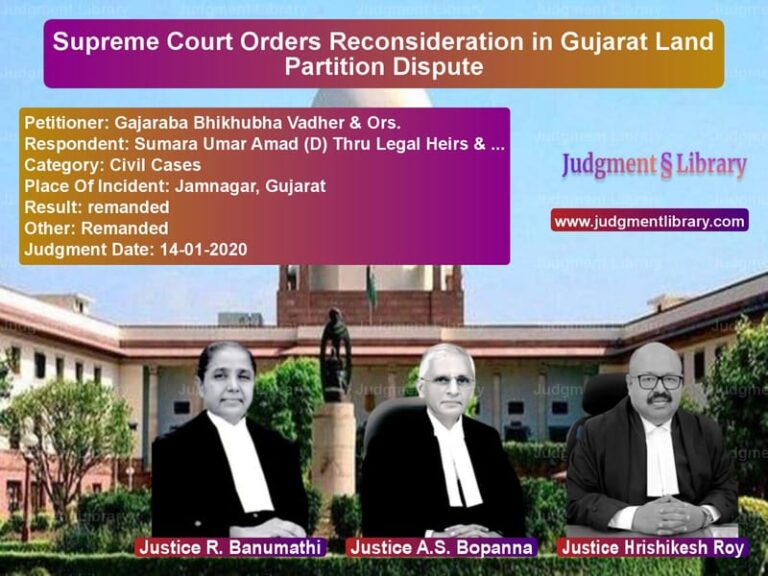Supreme Court Rules on Police Recruitment: Impact of Criminal History on Candidature
The Supreme Court of India, in the case of Commissioner of Police vs. Raj Kumar & Others, addressed a crucial issue concerning the eligibility of candidates with a prior criminal record for recruitment into the Delhi Police. The judgment dealt with multiple appeals challenging the Delhi High Court’s ruling, which had allowed candidates with past criminal cases to be considered for appointment as constables.
Background of the Case
In 2009, the Delhi Police issued a recruitment notification for the appointment of constables. The respondents (candidates) applied for the posts and disclosed that they had faced criminal charges in the past. The charges against them ranged from minor scuffles and brawls to serious accusations such as kidnapping. Although most of them had either been acquitted or had cases settled through compromise, their applications were rejected by the Delhi Police Screening Committee, citing concerns about their suitability for the police force.
The Central Administrative Tribunal (CAT) ruled in favor of the candidates, holding that their past criminal history should not automatically disqualify them. The Delhi High Court upheld the CAT’s ruling, leading the Commissioner of Police to challenge the decision before the Supreme Court.
Legal Issues Before the Supreme Court
The case raised several important legal questions:
- Whether a candidate acquitted of criminal charges, or whose case was settled through compromise, can be considered suitable for police service.
- Whether the Screening Committee’s decision to reject the candidature of such individuals was legally justified.
- The extent of judicial review over administrative decisions regarding recruitment to disciplined forces.
Petitioner’s Arguments (Commissioner of Police)
The Commissioner of Police argued that:
- The police force is a disciplined organization that requires individuals of impeccable integrity.
- The Screening Committee had carefully considered each candidate’s case and concluded that their past behavior made them unsuitable for a career in law enforcement.
- Even though some candidates were acquitted, their acquittal was not always on merits but due to technicalities, such as lack of evidence or compromise with the complainant.
- The courts should not interfere with the discretion exercised by the Screening Committee in assessing the suitability of candidates for police service.
Respondents’ Arguments
The candidates argued that:
- They had fully disclosed their past criminal cases in their application forms.
- Many of the cases against them were minor disputes, often resulting from personal enmities.
- In most instances, they had been acquitted, meaning that no guilt was established.
- The Screening Committee acted arbitrarily by rejecting their applications without considering individual circumstances.
- The Delhi High Court had rightly intervened to protect their right to be considered for public employment.
Supreme Court’s Observations
The Supreme Court examined the applicable laws, past judicial precedents, and the specific circumstances of each candidate before making its ruling.
1. The Importance of Integrity in the Police Force
The Court emphasized that police officers are entrusted with the responsibility of maintaining law and order. Any compromise in their integrity could have serious consequences for public trust in law enforcement.
“The police force is a disciplined force. It shoulders the great responsibility of maintaining law and order in society. A candidate wishing to join the police force must be a person of utmost rectitude. Even if he is acquitted or discharged, the nature of allegations must be considered.”
2. The Discretion of the Screening Committee
The Court ruled that the Screening Committee has the authority to assess whether a candidate is suitable for police service, even if they have been acquitted of criminal charges.
“The Screening Committee will be within its rights to cancel the candidature of a candidate if it finds that the acquittal is based on some serious flaw in the conduct of the prosecution case or is the result of material witnesses turning hostile.”
3. Distinction Between Acquittal and Clean Record
The Court distinguished between a “clean acquittal” and an acquittal due to a compromise or lack of evidence. It observed:
“An acquittal does not always mean the person was innocent. In cases where witnesses turned hostile or the case was settled through compromise, the employer is justified in assessing the moral character of the candidate.”
4. Judicial Review in Matters of Recruitment
The Court held that while courts can review administrative decisions for legality, they should not act as appellate authorities over recruitment decisions.
“Judicial review cannot extend to second-guessing the suitability of a candidate for public employment. Absent malice or illegality, the Screening Committee’s decision must be respected.”
Final Judgment
The Supreme Court allowed the appeal and set aside the Delhi High Court’s order. The key directives were:
- The Screening Committee’s decision to reject the candidates was upheld.
- The respondents were found unsuitable for appointment as constables in the Delhi Police.
- The courts must exercise restraint in interfering with recruitment decisions of disciplined forces.
“Recruitment to disciplined forces requires a higher degree of scrutiny. The judiciary should not substitute its wisdom for that of expert committees tasked with assessing candidates’ suitability.”
Implications of the Judgment
The ruling has several important implications:
- Higher Standards for Police Recruitment: Individuals with a history of criminal allegations, even if acquitted, will face scrutiny before being allowed into the police force.
- Limited Judicial Review: Courts will not easily interfere in administrative decisions regarding recruitment in disciplined forces.
- Importance of Character Assessment: The Screening Committee’s role in evaluating the background and integrity of candidates is reaffirmed.
- Acquittal Does Not Guarantee Employment: A mere acquittal does not automatically qualify a candidate for public employment.
This judgment underscores the need for maintaining high ethical standards in law enforcement and reinforces the principle that police officers must be above suspicion.
Petitioner Name: Commissioner of Police.Respondent Name: Raj Kumar & Others.Judgment By: Justice K.M. Joseph, Justice S. Ravindra Bhat.Place Of Incident: Delhi.Judgment Date: 25-08-2021.
Don’t miss out on the full details! Download the complete judgment in PDF format below and gain valuable insights instantly!
Download Judgment: commissioner-of-poli-vs-raj-kumar-&-others-supreme-court-of-india-judgment-dated-25-08-2021.pdf
Directly Download Judgment: Directly download this Judgment
See all petitions in Employment Disputes
See all petitions in Recruitment Policies
See all petitions in Public Sector Employees
See all petitions in Disciplinary Proceedings
See all petitions in Termination Cases
See all petitions in Judgment by K.M. Joseph
See all petitions in Judgment by S Ravindra Bhat
See all petitions in allowed
See all petitions in supreme court of India judgments August 2021
See all petitions in 2021 judgments
See all posts in Service Matters Category
See all allowed petitions in Service Matters Category
See all Dismissed petitions in Service Matters Category
See all partially allowed petitions in Service Matters Category







